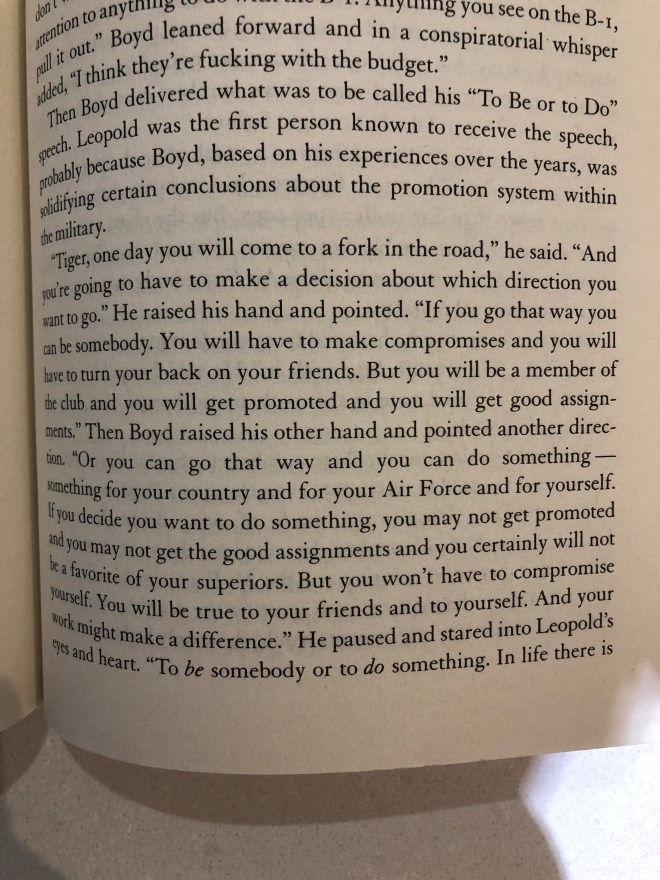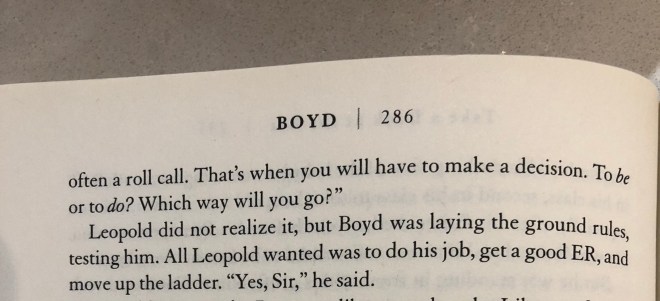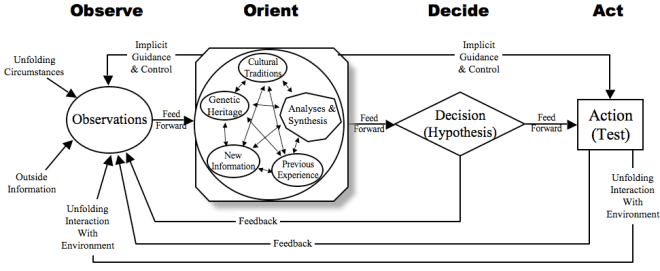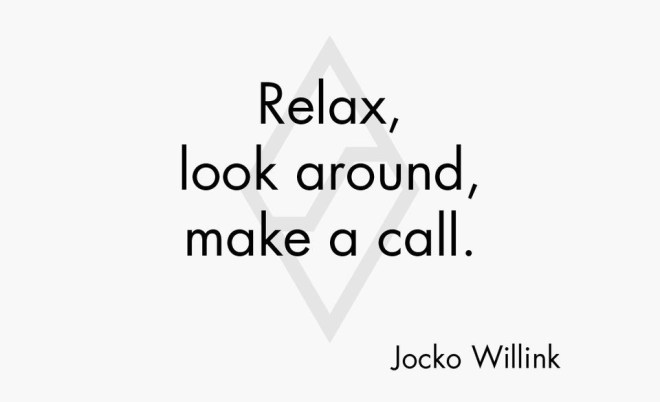25 pages in: Haven’t yet unfurled a single sticky tab.
50 pages in: I’m concerned the mighty tome I hold in my hands isn’t going to offer the rich vein of insight and knowledge I had hoped for, and I’m beginning to doubt Ryan Holiday’s recommendation.*
100 pages in: Surely by now there’d be signs of the lessons I’d hoped to uncover? Perhaps they’re in the next Chapter….? I shall press on, because this is turning into something more that I had expected.
150 pages in: Can’t put it down. I’ve abandoned hope of uncovering any specific leadership lessons, but am engrossed by the story of this relatively unknown fighter pilot and his campaign against the US Armed Forces, with whom he served from 1944-1975.
200 pages in: My previous fears are unfounded. It appears I’ve unknowingly stumbled headlong inside the mind of one of the most influential military theorists since Sun Tzu and Von Clausewitz, and there are lessons galore.
It’s like The Matrix. There is no escape. I’m a believer.
I can sense John Boyd is smiling…
“Took you a while tiger, but you got here”
* note to self: never doubt Ryan’s book recommendations again.
I first heard of John Boyd while reading Ego is the Enemy. It contained a small piece about a US Air Force Colonel who is considered by some to be one of history’s most prolific military theorists, but remains firmly in the darkness when it comes to notoriety. In one of his recommended reading lists, Holiday pointed to a book on Boyd, noting it as “required reading“.
It doesn’t matter if you’re interested in the design and function of fighter jets (which I’m not), or the military or military theory (which I am). The lessons to be learned in the Robert Coram book Boyd: The fighter pilot who changed the art of war go far beyond his influence on aircraft design, and extends into an unwavering campaign of self-belief that spanned 15 years and took on the entire might of the US Air Force.

It is simply not practical to try and explain the history and detail contained within the book. Distilling the 504 pages into a short blog post would not do justice to Coram, the book, nor to Boyd himself for that matter – who was a stickler for detail.
So apart from recommending the book, and suggesting you buy it, here are the Top 5 things I learned from Boyd: The fighter pilot who changed the art of war:
Manoeuvrability – it isn’t just sheer thrust, or speed, or fire-power that meant success in the air. It was the ability of a plane, and pilot, to transition between manoeuvres, turning defense into attack, or attack into slaughter, or defense into retreat. His Energy-Manoeuvrability (E-M) Theory is still the foundational piece in many elite military, business and sporting programs, and suggests that your ability to adapt and re-adapt is crucial to not just survival, but sustained success both in warfare, business, and in life.
‘Are you Being or Doing?’ – Boyd is perhaps most famous within the US military for a speech he gave young pilots who faced a cross-road in their career. I won’t do it the disservice of paraphrasing it, so have provided an excerpt from the book directly. In true Boyd fashion, it needs no explanation.


The OODA Loop – Boyd spent years developing not only ways to better design fighter jets and methods of waging aerial warfare, but ways to understand how decisions are made, and the cycle within which they live.
Search for John Boyd on Google and you’ll inevitably come up with reference to the OODA Loop. Management theorists see it as his defining piece of work, and many have since written complicated and detailed thesis papers on it.

Fundamentally it looks to explain the process that a person consciously, or sub-consciously runs when making any decision, big or small. The above diagram is lifted directly from the book and while there’s an obvious mountain of potential explanation behind it, this distillation of a complex process that takes place within your brain is particularly elegant, and better left to you to digest the detail.
I believe the trick here is not to try and actively interfere with the process, but simply be aware that it exists, and that if it exists for you, then it likely exists for every other human you interact with. Understanding that everyone makes different observations, and based on those observations orients themselves differently, and then decides and acts in accordance with those differences, makes for a much less stressful work or home environment during conflicts.
Jocko Willink has a similar approach for those who like their leadership strategies in 6 words or less.

Thinking strategically – Boyd’s ability to out think, out manoeuvre and simply out play entire arms of the United States military, from the outset looks to be the work of The Prince himself. Again, you don’t have to subscribe to military might, or even agree with the way the US handles waging war to appreciate the way Boyd moved the chess pieces to play out what he thought, no, believed, to be simply more important than anything else. His vision of the outcome allowed him to position those pieces better than his opponents, and there were many, very powerful opponents. He understood that in life and business, as in chess, you need to be thinking not just of your next 5-steps, but of your opponents next 5-steps too.
You can’t do it alone – Boyd had his Fighter Mafia, his Reformers, his Acolytes – a core group of people that believed the same as he did, that, in their own differing ways, sacrificed individual glory and fanfare to do what they thought was right, what was necessary, to protect the lives of US fighting forces. They worked symbiotically, centred around Boyd, sure, but collectively they changed the way the entire US military fights both air and ground war campaigns in a post-WWII era.
So to summarise my summary….
When you’ve found something you believe in, and are dedicated to seeing it through, find a bunch of like-minded people, think ahead, assess the threats, and when faced with uncertainty, don’t be afraid to make a call, act and understand the entire thing is a cycle.
All that from a loud-talking, cigar-smoking fly boy self-proclaimed “Ghetto Colonel” who grew up rough, and was told he’d never amount to anything.
Seems like sound advice to me, and really, isn’t learning from the everyday what it’s all about?
Do you have something you believe in? Something you sacrifice glory for in order for it to be realised? Have you read the book? What did you think? So many questions, so many opportunities for you to answer them!
Leave a comment below, or find us on the Contact page.


One thought on “John who?”